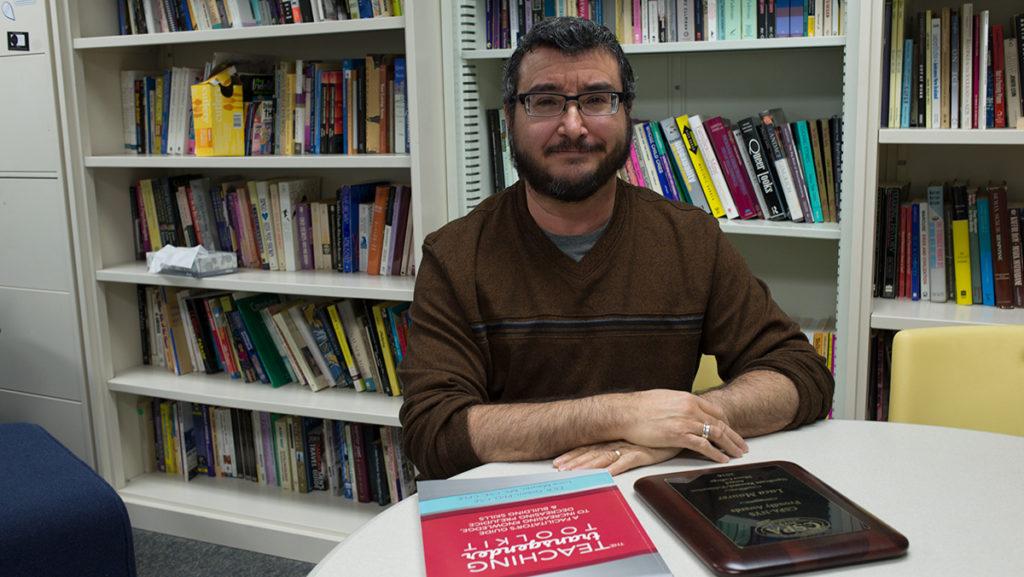Luca Maurer, program director for the Center for Lesbian, Gay, Bisexual and Transgender Education, Outreach and Services at Ithaca College, and Eli Green, assistant professor at Widener University and founder of the Transgender Training Institute, recently received an award for their book “The Teaching Transgender Toolkit: A Facilitator’s Guide to Increasing Knowledge, Reducing Prejudice & Building Skills.” The book is a collection of resources for people who want to facilitate trainings about transgender people and their experiences that was published last year.
The award, the Significant Research/Publication Award, was granted by the College Student Personnel Association of New York State to recognize a piece or published report that has merit and educational significance. “The Teaching Transgender Toolkit” is currently in its third printing, and several parts are also available for free online. Portions of the book sales go to supporting transgender-serving organizations.
Opinion Editor Celisa Calacal spoke with Maurer about the topics discussed in the toolkit, the response it has received and misconceptions that are addressed in the book.
This interview has been edited for length and clarity.
Celisa Calacal: Tell me about the Transgender Toolkit: What is it and what it’s about?
Luca Maurer: It’s a detailed collection of best practices, lesson plans and resources for folks who want to facilitate trainings about transgender people and transgender identities and experiences. Transgender people are in our families, in our communities, our schools, our faith communities. They’re part of our society, but stigma and discrimination make it extraordinarily difficult for transgender people to sort of make their way in the world. And I and my co-author, Eli Green, believe that education is the first step to helping people understand their transgender friends and neighbors and family members, and so that’s why we wrote the book.
CC: What are some topics you touch on in the book?
LM: There are many, many different topics. The entire first section is sort of foundations, so it’s frequently asked questions about transgender people, … questions and answers about the most common questions and confusions that many people have. There are several sections about intersectionality and why that’s an incredibly critical topic, especially when we’re talking about transgender people. Because again, transgender people, especially transgender people of color, face multiple marginalizations and face extraordinary discrimination. And so we want anybody learning about transgender people or wanting to teach about transgender people to understand the ways that race, particularly, and class, and sexual orientation, and age and ability — and a whole host of other dimensions of diversity — intersect with transgender people’s lives to give them different kinds of experiences. In addition to that, there is a section for people who work on college campuses. There’s a section for people who are medical and health care providers. There’s a section for counselors. There’s a section for K through 12 schoolteachers. … And then at the end, there’s an extensive resource list of, again, a variety of free publications people can access and also recommended other books and resources that you can find at the library or online and things like that. … Also my co-author, Eli, and I were very, like I said, are very, very committed to lifting up actual transgender people. And so a portion of the proceeds of the sale of the book are donated to support transgender-led and transgender-serving organizations who focus primarily on providing services and advocating for the most marginalized members of the transgender communities, particularly transgender people of color and transgender people in rural communities. … So a portion of all the proceeds goes directly back to transgender-led organizations themselves to be able to continue doing the work to assist transgender people.
CC: What are some misconceptions you try to address that are distinct to educators?
LM: One that’s very big is about intersectionality and multiple identities. It’s common that I will hear a person refer to transgender people and then separately refer to people of color. And I’m like, “Those groups of people overlap.” Or, you know, they’ll talk about students with disabilities and transgender students. And I’m like, “There are students with both of those experiences and both of those identities.” So one common misconception is sometimes some folks — not everyone, some folks — you know, will approach me and say, “Well tell me about transgender students.” And then approach someone else and say, “Tell me about students of color, or tell me about first-generation students. Tell me about international students.” And I’m like, “Wait wait wait. Transgender students are all of those too.” … Another huge misconception: People confuse gender identity and sexual orientation. That’s huge. So they’re separate, right — being gay, lesbian or bisexual or queer or pansexual is about to whom you are attracted. Being transgender is within yourself; your sense of who you are in your heart, your mind, your soul as a gendered person, right. But it’s a very common confusion. So again, there are some transgender people who are heterosexual, some transgender people who are gay or lesbian or bi, pan or queer.
CC: How do you feel about the response that you’ve gotten to this toolkit?
LM: I’m pretty excited. … We know that people are having these conversations already. We already know that they’re happening at PTAs. We know they’re happening at kitchen tables at home. We know that they’re happening in congregations. We know that they’re happening on college campuses because, you know, I’m a part of those, right. Like, I hear people. People contact my office for resources or for help or for advice all the time. And we thought, well instead of us just doing this separately, individually, what if we put everything in one place? That could really help. So I’m really happy with the response. … It seems like our goal of being helpful to people — it seems like we did well, so I’m pretty happy about that.














